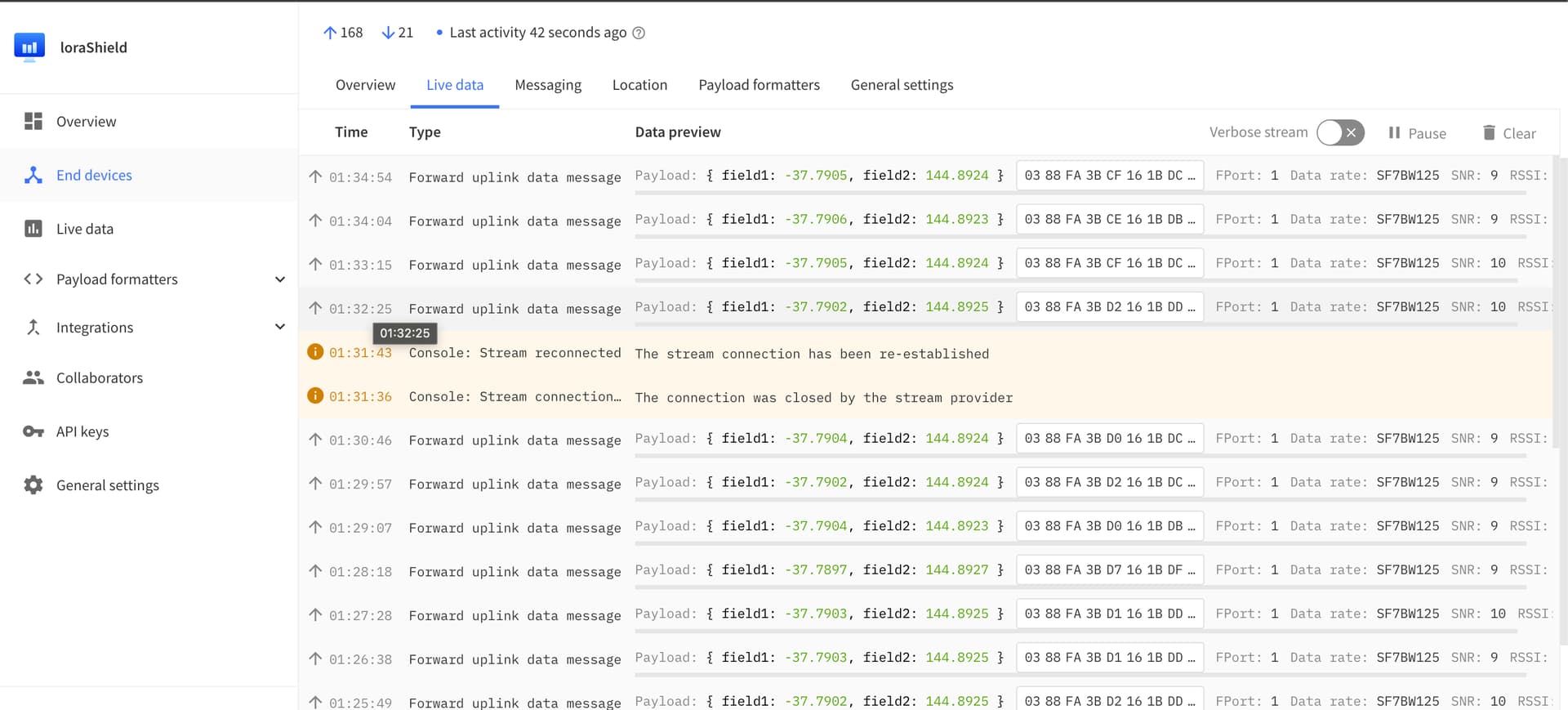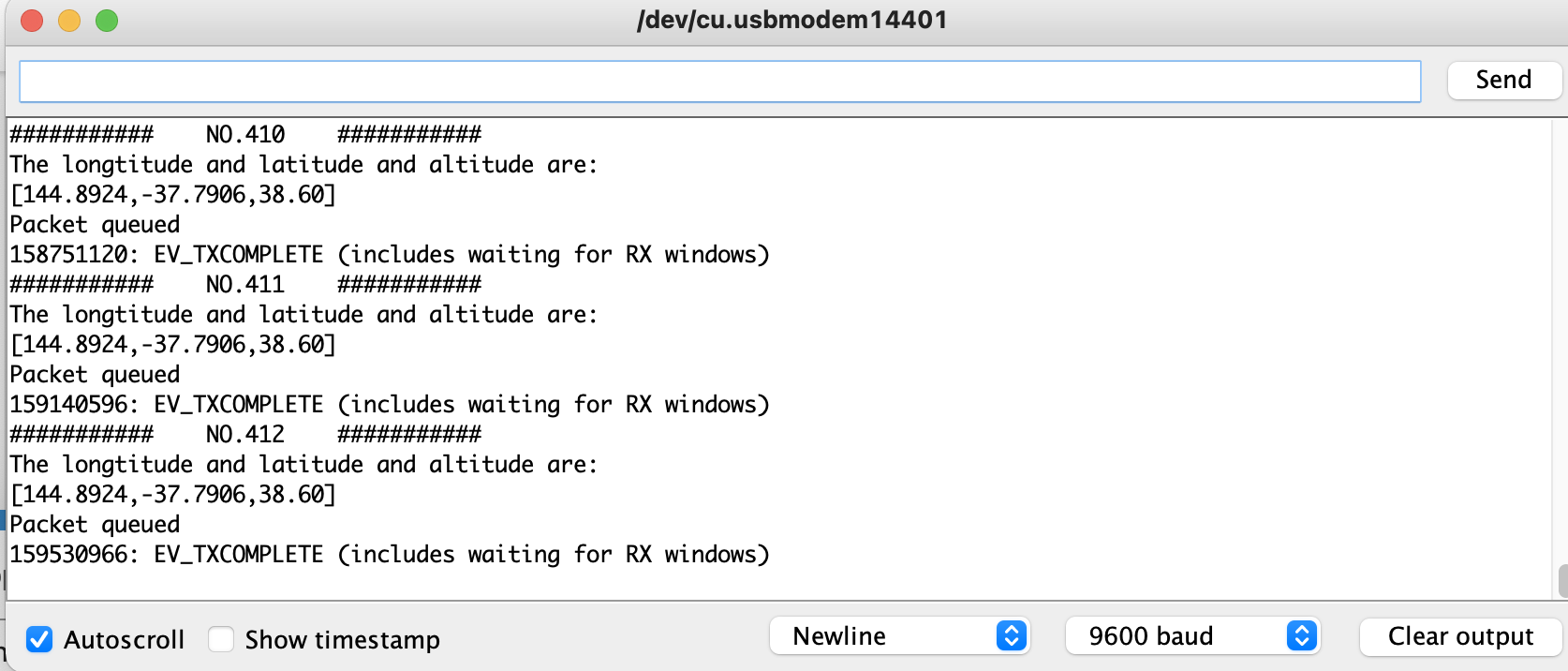i am receiving the data on the TTN every 50s only. how to make this less delay as I am trying to plot map out of this data.

below on serial port it refreshes very 3 sec

below is the sketch for this GPS tracking
#include <TinyGPS.h>
#include <lmic.h>
#include <hal/hal.h>
#include <SPI.h>
#include <SoftwareSerial.h>
TinyGPS gps;
SoftwareSerial ss(3, 4); // Arduino RX, TX to conenct
static void smartdelay(unsigned long ms);
unsigned int count = 0; //For times count
float longitude,latitude;
float flat,flon,falt;
static uint8_t mydata[11] ={0x03,0x88,0x00,0x00,0x00,0x00,0x00,0x00,0x00,0x00,0x00};
// LoRaWAN NwkSKey, network session key
// This is the default Semtech key, which is used by the early prototype TTN
// network.
static const PROGMEM u1_t NWKSKEY[16] = { 0xB6, 0x19, 0xFF, 0x60, 0xB6, , 0x20, 0x04, 0x1B, 0x56, 0x8F, 0x7D, 0x81, 0xE1, 0x99, 0x32 };
static const u1_t PROGMEM APPSKEY[16] = { 0xF1, 0x02, 0x23, 0x74, 0x49, 0xC5, 0xB1, 0xBF, 0x7C, 0xF1, 0x3D, 0xD3, 0x84, 0x43, 0x18 };
static const u4_t DEVADDR = 0x260D151B;
// These callbacks are only used in over-the-air activation, so they are
// left empty here (we cannot leavåe them out completely unless
// DISABLE_JOIN is set in config.h, otherwise the linker will complain).
void os_getArtEui (u1_t* buf) { }
void os_getDevEui (u1_t* buf) { }
void os_getDevKey (u1_t* buf) { }
static osjob_t sendjob;
// Schedule TX every this many seconds (might become longer due to duty
// cycle limitations).
const unsigned TX_INTERVAL = 3;
// Pin mapping
const lmic_pinmap lmic_pins = {
.nss = 10,
.rxtx = LMIC_UNUSED_PIN,
.rst = 9,
.dio = {2, 6, 7},
};
void onEvent (ev_t ev) {
Serial.print(os_getTime());
Serial.print(": ");
switch(ev) {
case EV_JOINING:
Serial.println(F("EV_JOINING"));
break;
case EV_JOINED:
Serial.println(F("EV_JOINED"));
break;
case EV_JOIN_FAILED:
Serial.println(F("EV_JOIN_FAILED"));
break;
case EV_REJOIN_FAILED:
Serial.println(F("EV_REJOIN_FAILED"));
break;
case EV_TXCOMPLETE:
Serial.println(F("EV_TXCOMPLETE (includes waiting for RX windows)"));
if (LMIC.txrxFlags & TXRX_ACK)
Serial.println(F("Received ack"));
if (LMIC.dataLen) {
Serial.println(F("Received "));
Serial.println(LMIC.dataLen);
Serial.println(F(" bytes of payload"));
}
// Schedule next transmission
os_setTimedCallback(&sendjob, os_getTime()+sec2osticks(TX_INTERVAL), do_send);
break;
case EV_RXCOMPLETE:
// data received in ping slot
Serial.println(F("EV_RXCOMPLETE"));
break;
default:
Serial.println(F("Unknown event"));
break;
}
}
// World Geodetic System ==> Mars Geodetic System
double transformLat(double x, double y)
{
double ret = -100.0 + 2.0 * x + 3.0 * y + 0.2 * y * y + 0.1 * x * y + 0.2 * sqrt(abs(x));
ret += (20.0 * sin(6.0 * x * M_PI) + 20.0 * sin(2.0 * x * M_PI)) * 2.0 / 3.0;
ret += (20.0 * sin(y * M_PI) + 40.0 * sin(y / 3.0 * M_PI)) * 2.0 / 3.0;
ret += (160.0 * sin(y / 12.0 * M_PI) + 320 * sin(y * M_PI / 30.0)) * 2.0 / 3.0;
return ret;
}
double transformLon(double x, double y)
{
double ret = 300.0 + x + 2.0 * y + 0.1 * x * x + 0.1 * x * y + 0.1 * sqrt(abs(x));
ret += (20.0 * sin(6.0 * x * M_PI) + 20.0 * sin(2.0 * x * M_PI)) * 2.0 / 3.0;
ret += (20.0 * sin(x * M_PI) + 40.0 * sin(x / 3.0 * M_PI)) * 2.0 / 3.0;
ret += (150.0 * sin(x / 12.0 * M_PI) + 300.0 * sin(x / 30.0 * M_PI)) * 2.0 / 3.0;
return ret;
}
void WGS2GCJTransform(float wgLon, float wgLat, float &mgLon, float &mgLat)
{
const double a = 6378245.0;
const double ee = 0.00669342162296594323;
double dLat = transformLat(wgLon - 105.0, wgLat - 35.0);
double dLon = transformLon(wgLon - 105.0, wgLat - 35.0);
double radLat = wgLat / 180.0 * M_PI;
double magic = sin(radLat);
magic = 1 - ee * magic * magic;
double sqrtMagic = sqrt(magic);
dLat = (dLat * 180.0) / ((a * (1 - ee)) / (magic * sqrtMagic) * M_PI);
dLon = (dLon * 180.0) / (a / sqrtMagic * cos(radLat) * M_PI);
mgLat = wgLat + dLat;
mgLon = wgLon + dLon;
}
void GPSRead()
{
unsigned long age;
gps.f_get_position(&flat, &flon, &age);
falt=gps.f_altitude(); //get altitude
flon == TinyGPS::GPS_INVALID_F_ANGLE ? 0.0 : flon, 6;//save six decimal places
flat == TinyGPS::GPS_INVALID_F_ANGLE ? 0.0 : flat, 6;
falt == TinyGPS::GPS_INVALID_F_ANGLE ? 0.0 : falt, 2;//save two decimal places
if((flon < 72.004 || flon > 137.8347)&&(flat < 0.8293 || flat >55.8271)) //out of China
{
longitude=flon;
latitude=flat;
// Serial.println("Out of China");
}
else
{
WGS2GCJTransform(flon,flat,longitude,latitude);
// //Serial.println("In China");
}
int32_t lat = latitude * 10000;
int32_t lon = longitude * 10000;
int32_t alt = falt * 100;
mydata[2] = lat >> 16;
mydata[3] = lat >> 8;
mydata[4] = lat;
mydata[5] = lon >> 16;
mydata[6] = lon >> 8;
mydata[7] = lon;
mydata[8] = alt >> 16;
mydata[9] = alt >> 8;
mydata[10] = alt;
}
void printdata(){
Serial.print(F("########### "));
Serial.print(F("NO."));
Serial.print(count);
Serial.println(F(" ###########"));
if(flon!=1000.000000) //Successfully positioning
{
Serial.println(F("The longtitude and latitude and altitude are:"));
Serial.print(F("["));
Serial.print(longitude,4);
Serial.print(F(","));
Serial.print(latitude,4);
Serial.print(F(","));
Serial.print(falt);
Serial.print(F("]"));
Serial.println(F(""));
count++;
}
else
{
Serial.println(F("Fail positioning"));
}
}
static void smartdelay(unsigned long ms)
{
unsigned long start = millis();
do
{
while (ss.available())
{
gps.encode(ss.read());
}
} while (millis() - start < ms);
}
void do_send(osjob_t* j){
// Check if there is not a current TX/RX job running
if (LMIC.opmode & OP_TXRXPEND) {
Serial.println(F("OP_TXRXPEND, not sending"));
} else {
smartdelay(1000);
GPSRead();
printdata();
// Prepare upstream data transmission at the next possible time.
LMIC_setTxData2(1, mydata, sizeof(mydata), 0);
Serial.println(F("Packet queued"));
}
// Next TX is scheduled after TX_COMPLETE event.
}
void setup() {
Serial.begin(9600);
Serial.println(F("Starting"));
ss.begin(9600);
#ifdef VCC_ENABLE
// For Pinoccio Scout boards
pinMode(VCC_ENABLE, OUTPUT);
digitalWrite(VCC_ENABLE, HIGH);
delay(1000);
#endif
// LMIC init
os_init();
// Reset the MAC state. Session and pending data transfers will be discarded.
LMIC_reset();
// Set static session parameters. Instead of dynamically establishing a session
// by joining the network, precomputed session parameters are be provided.
#ifdef PROGMEM
// On AVR, these values are stored in flash and only copied to RAM
// once. Copy them to a temporary buffer here, LMIC_setSession will
// copy them into a buffer of its own again.
uint8_t appskey[sizeof(APPSKEY)];
uint8_t nwkskey[sizeof(NWKSKEY)];
memcpy_P(appskey, APPSKEY, sizeof(APPSKEY));
memcpy_P(nwkskey, NWKSKEY, sizeof(NWKSKEY));
LMIC_setSession (0x1, DEVADDR, nwkskey, appskey);
#else
// If not running an AVR with PROGMEM, just use the arrays directly
LMIC_setSession (0x1, DEVADDR, NWKSKEY, APPSKEY);
#endif
for (int channel=0; channel<8; ++channel) {
LMIC_disableChannel(channel);
}
for (int channel=16; channel<72; ++channel) {
LMIC_disableChannel(channel);
}
// Disable link check validation
LMIC_setLinkCheckMode(0);
// TTN uses SF9 for its RX2 window.
LMIC.dn2Dr = DR_SF9;
// Set data rate and transmit power for uplink (note: txpow seems to be ignored by the library)
LMIC_setDrTxpow(DR_SF7,14);
// Start job
do_send(&sendjob);
}
void loop() {
os_runloop_once();
}